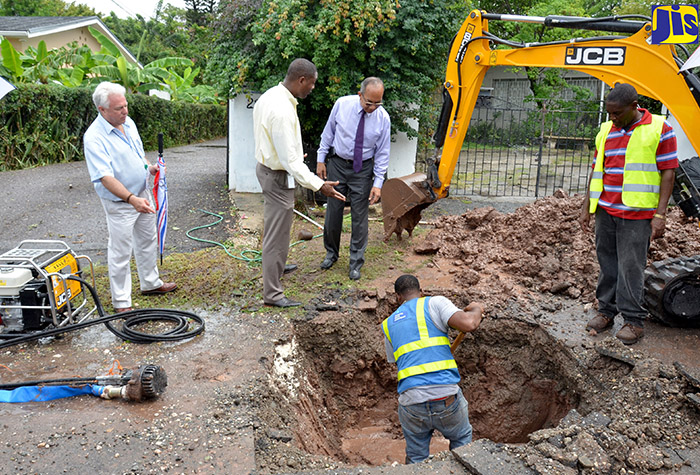NWC Reduces Loss in Potable Water during Transmission
By: , March 13, 2018The Key Point:
The Facts
- The US$42.5-million Non-Revenue Water (NRW) Co-Management Project, which is being implemented through funding from the Inter-American Development Bank (IDB), aims to strengthen the institutional capacity of the NWC in order to improve its performance and maximise the collection of income for the water it produces.
- In addition, 150 employees are being trained to ensure a highly skilled and dedicated NRW management team at the NWC, to allow for the ongoing use of best practices after completion of the project.
The Full Story
The National Water Commission (NWC) is reporting a marked reduction in the amount of potable water lost during transmission, since hiring Miya Water Company from Israel to help tackle the problem.
“So far, we have definitely seen improvements. The number of leaks have reduced significantly in the Cherry Gardens, Norbrook and Barbican areas. We’ve had a lot of work done in the Smokey Vale and Perkins Boulevard areas in Kingston,” President of the NWC, Mark Barnett, tells JIS News.
The US$42.5-million Non-Revenue Water (NRW) Co-Management Project, which is being implemented through funding from the Inter-American Development Bank (IDB), aims to strengthen the institutional capacity of the NWC in order to improve its performance and maximise the collection of income for the water it produces.
It involves an audit of the NWC network to determine the precise situation with regard to NRW and how best to reduce these figures to about 30 per cent within the fifth year of the project.
In addition, 150 employees are being trained to ensure a highly skilled and dedicated NRW management team at the NWC, to allow for the ongoing use of best practices after completion of the project.
Mr. Barnett says despite the disruptions being experienced by its customers, the activities being carried out by the NWC are primarily for their benefit.
“The NRW activities are here to improve our system. But it will get worse before it gets better. We’re still going to be digging up the roads, there’s no way around it. The other thing is with the many road resurfacings that have been carried out, a lot of the valves that are critical to the network have been asphalted over. So, you will see us digging up intersections because that’s where most of the valves are located,” he points out.
The President says discussions will be held with the National Works Agency (NWA) to ensure that its contractors avoid covering these valves going forward.
He notes that the work of Miya has resulted in a reduction of non-revenue water in some district metering zones of up to 50 per cent.
Country Manager of Miya Water Company, Alvaro Ramalho, tells JIS News that the company has an international footprint in Africa, Asia, South America and the Caribbean doing non-revenue water projects for several companies.
Miya also operates a company in Portugal, similar to the NWC, where it is managing water systems for seven municipalities covering over 600,000 people.
Mr. Ramalho points out that the company has a 10-year project in The Bahamas, where they have reduced non-revenue water from 50 to 30 per cent.
“This is what we want to do here. I think co-management with the NWC is a wonderful experience. The first objective of the project was building capacity, and we are working with 35 experts from Miya and 135 from the NWC,” he notes.
“We did a lot of training, and, today, we can now do leak detection, leak repair and pressure management for non-revenue water very efficiently,” the Country Manager says.
He points out that they now have 10 teams out every day looking for the non-visible leaks, “and we’re already seeing results in some of the neighbourhoods that we’ve worked.”
In the meantime, Mr. Barnett points out that the NWC has plans to increase its attention on rural areas as it intensifies activities to reduce NRW loss.
“In Kingston, it’s about 60 per cent. Clarendon and St. Elizabeth are in the order of 75 to 80 per cent, and those are primary areas where we are focused, because it is unsustainable,” he says.
“We produce just about 180 million gallons of water (per day) islandwide. It, therefore, means that whatever revenue we are now generating could be far greater if our ability to deliver is improved,” the President adds.
The partnership agreement with Miya Water Company is expected to end in 2020.


